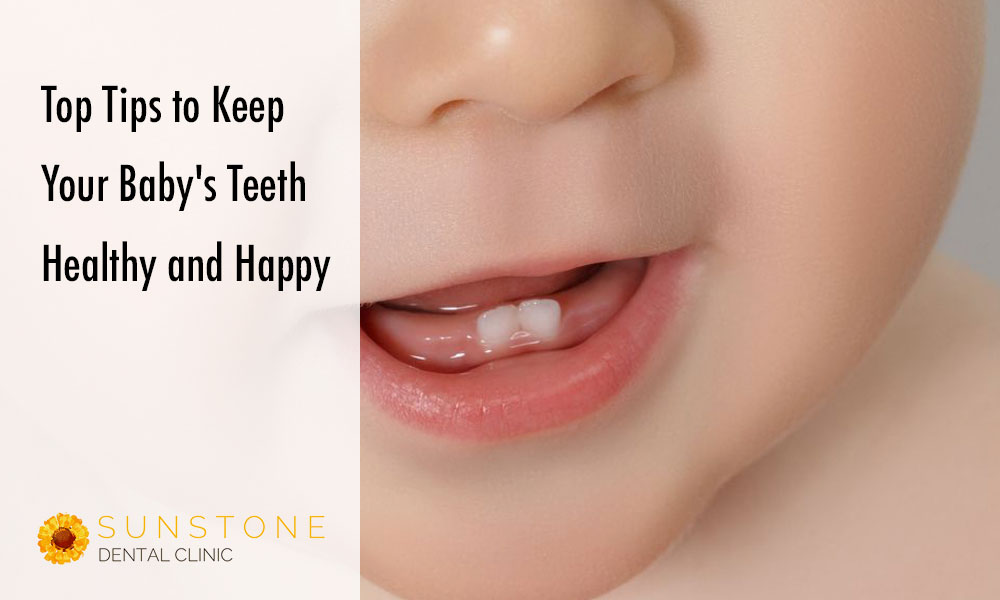We love to see our baby’s smile light up the room. Keeping that smile healthy and happy means taking care of their teeth. But where do you start? Here are the top tips to keep your baby’s teeth in great shape, ensuring they can flash those pearly whites for years to come.
Importance of oral health for babies
Your baby’s oral health is crucial for their overall well-being, as good oral hygiene sets the foundation for healthy teeth and gums. Baby teeth help your child chew and speak properly and act as placeholders for permanent teeth. Neglecting dental care can lead to cavities and gum disease.
When should you start caring for your baby’s teeth?
Many parents wonder when to start caring for their baby’s teeth, and the answer is earlier than you might think. Even before the first tooth emerges, clean their gums after each feeding to maintain oral hygiene and soothe teething discomfort. Once the first tooth appears, switch to a baby toothbrush with soft bristles and a small head, or use a finger toothbrush for better control. Use a rice-sized amount of fluoride toothpaste for babies under three to strengthen enamel and prevent decay, gradually increasing to a pea-sized portion as they grow.
Signs of healthy baby teeth
Knowing what to look for in healthy baby teeth is crucial for early detection of potential problems. Here are key signs to watch out for:
White and Smooth: Healthy baby teeth should be white and have a smooth surface. Discoloration or roughness could indicate tooth decay or enamel erosion.
No Swelling or Redness: The gums around your baby’s teeth should look healthy, without any swelling, redness, or bleeding, which could signal gum disease or infection.
No Bad Breath: While occasional bad breath is normal, persistent foul breath can be a sign of tooth decay or other dental issues. If your baby’s breath consistently smells unpleasant, consult a dentist.
No Visible Cavities: Healthy baby teeth should be free from visible cavities or dark spots. Any holes or discoloration require prompt dental care.
Common dental problems in babies
Despite our best efforts, dental problems can still occur in babies. Here are some common issues you may encounter:
Teething Discomfort: Teething can cause irritability, drooling, and a desire to chew on objects. Offer a clean, chilled teething ring or a cold washcloth to soothe the discomfort. Avoid using teething gels or numbing agents unless recommended by a pediatric dentist.
Baby Bottle Tooth Decay: Frequent exposure to sugary liquids like formula, milk, or juice can lead to tooth decay. Prevent this by avoiding bedtime bottles, cleaning your baby’s gums after feeding, and encouraging the use of a regular cup as they transition from bottles.
Thumb Sucking: While sucking thumbs or fingers is normal, prolonged habits can affect tooth alignment and jaw development. If your baby continues this habit past age three, address it to prevent dental issues.
Tooth Injuries: Babies are curious and may sometimes injure their teeth through falls or accidents. If a tooth chips, cracks, or becomes loose, seek immediate dental care to assess and address the damage.
Tips for proper oral hygiene for babies
Now that we understand the importance of oral health and common dental problems in babies, here are some practical tips for maintaining proper oral hygiene:
Start Early: Clean your baby’s gums with a damp cloth after feeding, even before the first tooth appears. Once the first tooth emerges, use a soft-bristled toothbrush and a rice-sized amount of fluoride toothpaste.
Brush Twice a Day: Establish a routine of brushing your baby’s teeth twice daily. Use gentle, circular motions to brush all surfaces. Make brushing fun and interactive to encourage cooperation.
Monitor Fluoride Intake: Ensure your baby gets the right amount of fluoride. Too much can cause fluorosis, which leads to white spots or stains on teeth. Use the correct amount of fluoride toothpaste based on your baby’s age.
Encourage a Balanced Diet: Offer a variety of nutrient-rich foods like fruits, vegetables, whole grains, and lean proteins. Limit sugary snacks and drinks to prevent tooth decay.
Avoid Harmful Habits: Discourage thumb sucking and pacifier use beyond age three to prevent dental issues. If using a pacifier, choose orthodontic ones designed to minimize tooth alignment impact.
Schedule Regular Dental Check-Ups: Babies should have their first dental visit by their first birthday, as recommended by the American Academy of Pediatric Dentistry. Regular check-ups help monitor dental development and address concerns early.
Lead by Example: Children mimic their parents. Practice good oral hygiene yourself and let your baby see you brushing your teeth to make it a family activity.
Build a lifetime of good oral health for your baby
Taking care of your baby’s teeth may seem daunting, but with the right knowledge and habits, it can easily become part of your daily routine. Start early, use appropriate tools, and maintain a nutritious diet to keep your baby’s teeth healthy. Monitor for any signs of trouble and seek professional dental care if needed. By following these tips and establishing good oral hygiene habits, you’re setting the stage for a lifetime of beautiful smiles and optimal oral health. Call Sunstone Dental Clinic at (604) 428-8722 to schedule an appointment.

